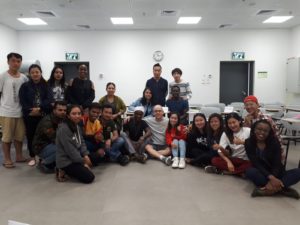
Daniel Dean knows something about taking intelligent risks. The Bala Cynwyd-based management consultant and executive was a founding principal of PREIT Capital Advisors, and serves as the managing director of Real Property Capital.
Taking intelligent risk has been his professional life.
It’s that sensibility, combined with a long-nurtured love for Israel and its inhabitants, that brought Dean to the Arava International Center for Agriculture Training, an international agricultural school in a small Israeli town on the border with Jordan. It’s also what brought the Dean Family Fellowship to life.
At AICAT, students from developing countries are brought to the Israeli town of Sapir to further their studies in agriculture and agronomy. Working in the harsh conditions of the Arava, a typically dry region in southern Israel, students gain the skills to bring change back to their home communities, according to Hanni Arnon, executive director of AICAT since 1994. The hope is that those students — and their successes — will go on to become ambassadors for Israel in their own countries.
Dean’s grandfather, David Dean, began visiting the Arava in the 1970s, and it became a family heirloom of sorts, passed down between generations. Dean’s father, Morris Dean, a prominent Philadelphia lawyer, has supported development in the Arava for decades through JNF-USA.
When Dean was set to visit Israel for the umpteenth times a few years back, his father asked him to visit the Arava, just to check in on developments in the region.
Working with Marina Furman, JNF-USA’s Philadelphia-based executive director of national major donor advancement, Dean arranged to meet with JNF-USA’s CEO Russell Robinson. Robinson, Dean said, directed him toward AICAT. At first, Dean said, he wasn’t so sure what to expect in the small town of Sapir. But what he saw astounded him.
“Somehow, these young people find themselves in Israel learning agronomy from farmers in some of the toughest farming conditions in the world, and I start to hear the statistics on the amount of output that the Arava has, with limited resources, limited and brackish water,” Dean recalls. “And I’m so taken, I’m sitting there saying, ‘These guys have really figured out how to turn the desert into something special.’ And very smart Israelis are telling about how, for the first time, the Arava has the potential to become the Silicon Valley of agriculture.”
The gears started turning, and Dean worked with Robinson and JNF-USA to make a shidduch between his family and AICAT. The Dean Family Fellowship, a grant-making program intended to spark small enterprise in AICAT graduates’ communities, is both a bid for small-business success and an attempt “to export goodwill for Israel,” Dean explained. The family’s initial gift was enough to support a five-year partnership with AICAT.
AICAT, Arnon explained, has the capacity to support students who come to Israel (around 1,000 students each year). But when they return to their home countries, that’s typically where the relationship comes to a close. When Dean reached out to her with his proposal a few years back — a fellowship that would reward AICAT graduates who win a business plan contest with a grant, one that they would get to work with back home — Arnon was delighted.
“I said, ‘Wow, this is exactly what we need, what we don’t have,’” Arnon said.
The first three winners were selected in November, according to The Jerusalem Post. Dennis Tomoina, Menawati ‘Mena’ Hutabalian and Vanna Re — hailing from Kenya, Indonesia and Cambodia — had their business plans funded. Tomoina created an agricultural startup; Hutabalian, a chili pepper farm intended to economically empower women; and Re, a year-round rice storage business that will allow rice farmers to dry, store and sell rice outside of the typical harvest season.
“With the support of these grants, they can bring changes to their home countries, to the villages, to their families,” Arnon said.
Should their ventures succeed, the winners have agreed to return 1-2% of their revenue to AICAT to make the fellowship a self-sustaining program. And since the fellowship was launched, an anonymous San Francisco donor made a significant contribution to the Dean family’s original gift, one that will allow 10 grants to be awarded at a minimum of $5,000 each. At present, 99 applications are being whittled down for a class of
five fellows.
For Dean, the chance to help creative, energetic young people while developing advocates for Israel at the same time is a tremendous opportunity in itself.
“There’s no ask here from us,” he said. “We’re not asking for a dollar. We just want to be able to say to young people who have the guts to come to Israel from different parts of the world to learn, ‘We believe in you, we’re ready to take a chance on you.’”
[email protected]; 215-832-0740




This is a great idea would like to thank the Dean family,also it could be better if can offer more funds so as we can start our own businesses and depend on our selves and the community can develop through us